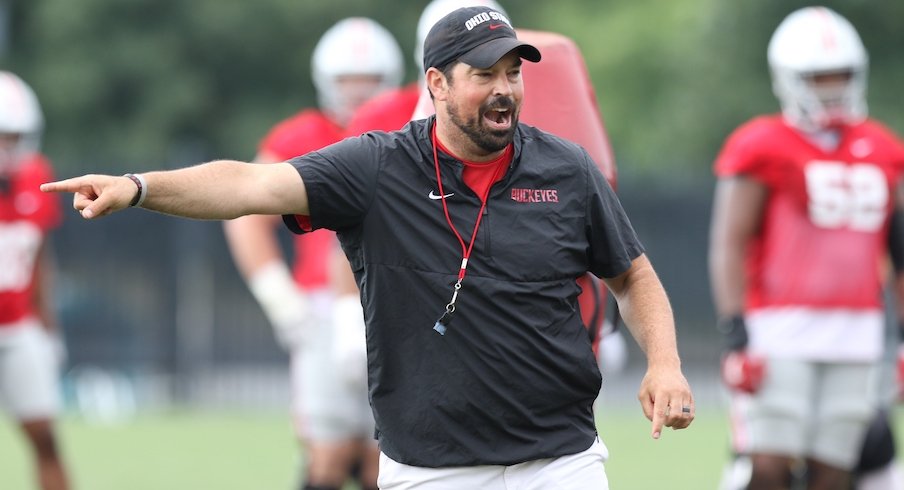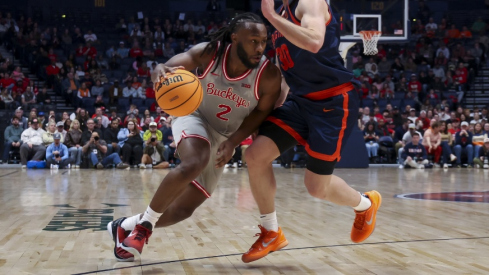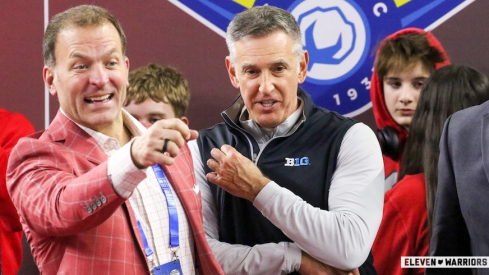In a teleconference with reporters on Wednesday morning, Ohio State coach Ryan Day was asked questions about the possibility of the college football season being shortened or being played without fans.
Both of his answers started with the same phrase: “Any football’s better than no football.”
As uncertainty looms over the 2020 college football season due to the ongoing coronavirus pandemic, Day understands the reality. The likelihood of college football season being impacted to at least some extent is increasing, and as Ohio State’s head coach, he needs to be prepared to adapt to whatever changes might come.
He says he will be prepared for that challenge, and he expects his staff and players to be ready, too.
“We’ll do whatever we need to do, and we’ll make it work, whatever they tell us the parameters are. And we’ll adapt and we’ll play,” Day said. “We’re OK with adapting. We’d obviously love to play the whole season, and expecting to play the whole season, but if that’s what happens, then we’ll figure it out.”
As of now, it’s still too early to know what will happen this fall. The full season could possibly be played as scheduled, with or without fans in the stands. The season could feasibly be shortened – conference games only is one possibility – or pushed back to start at a later date. The worst-case scenario, which Day and everyone involved in college football wants to avoid, would be no season at all.
Day didn’t express any specific opinions about what he thinks should happen on Wednesday, noting that the Big Ten has asked its coaches not to comment publicly on the conversations they’ve had about potential options for proceeding forward. He thinks it is important, though, for there to be continual conversations between coaches and other leaders in college athletics to consider possible models for how the season could be played if it needs to be altered.
“Certainly, it’s going to come down to the different task forces and committees that have come together and the medical authorities on where we start with this. And that’s really where it begins. And then from there, we’re gonna have to kind of as football coaches give our input and try to figure it all out,” Day said. “The first concern is public health and the student-athletes’ welfare and well-being. So we have to start with that. And then once we kind of get those guidelines of return to play, return to work, then we can kind of start building that. But yeah, I think we have to look at all different options.
“I think there’s a lot of smart people in the world, there’s a lot of smart people in college football and the NCAA, and I think we’ll come up with a great solution if we put our minds to it. But there’s just so many still unknowns that it’s hard to move anything. I do think we can create some models of different plans based on return to play, but I still think it’s too early on that. So I think the best thing to do is keep talking this thing through, and keep everything as up to date as possible, and then once some decisions are made and we get a better feel for where this thing’s going, then we can make some quick decisions.”
“We’re OK with adapting. We’d obviously love to play the whole season, and expecting to play the whole season, but if that’s what happens, then we’ll figure it out.”– Ryan Day on the possibility of a shortened season
Day has expressed that he believes college football teams will need to be back on campus for about six weeks before they are able to play any games, so that they have adequate time to prepare for the season to avoid increasing the risk of injuries. That isn’t a hardline stance, though, as he says some people believe they can get away with less while others believe more time is needed to ramp up to the season.
“Some people think we can do it in four (weeks), some people say we need eight. Six is kind of in between, and then what do those (weeks) look like?” Day said. “There’s a lot of committees that are involved in this right now that are talking about those very things. At the end of the day, it’s going to come down to a lot of the medical authorities. And as coaches, we just need to give our input of what we think the minimum would be to go play a game. So six weeks is kind of the starting point, but where it goes from there, we’ll see.”
Whether the season can start on time, therefore, will depend on when team activities are cleared to resume; if players aren’t yet back on campus by the middle of July, then it’s likely the season will need to be altered in some way.
It's unlikely college football season will begin before colleges are able to have their full student populations back on campus, as commissioners from Football Bowl Subdivision conferences told Vice President Mike Pence on Wednesday that games will not be played until universities have reopened, according to CBS Sports' Dennis Dodd.
Playing games without fans is a possibility that could at least be considered. Dr. Anthony Fauci, the director of the National Institute of Allergy and Infectious Disease, said in an interview on Wednesday that he believes playing games in empty stadiums could be a feasible solution.
While Day acknowledged that games without fans “would be eerie, for sure,” he’s open to the possibility if it means playing football instead of not playing football. Like Ohio State athletic director Gene Smith, though, Day raised the question of whether games would actually be safe for the players if it’s not safe for fans to attend.
“I think the biggest challenge with that is going to be if it’s not safe for the fans, then how is it safe for the players and coaches and those type of people,” Day said. “Hopefully with testing and all the different things that come up over the next couple months, we’re able to answer those questions. But I certainly think it’s worth talking about and exploring based on the parameters that are set here over the next three to four months.”
Ultimately, Day will lean on medical experts in determining whether the football program needs to implement new safety measures whenever they are able to reconvene and start practicing and playing games again. That said, he recognizes that things are probably going to be different in one way or another.
“I’m just gonna rely on the doctors and on the medical people and people at the university to kind of give me some guidelines on that and give us some guidelines on that and then once we get those guidelines, we’ll adapt,” Day said. “But we’re ready for a new norm. We’re ready for understanding that behavior and the way we act and the way we go about our daily routines are going to be different, and once we’re kinda given those guidelines, then we’ll kinda go from there. But we know that it’s probably not going to be the same as it’s been.”


